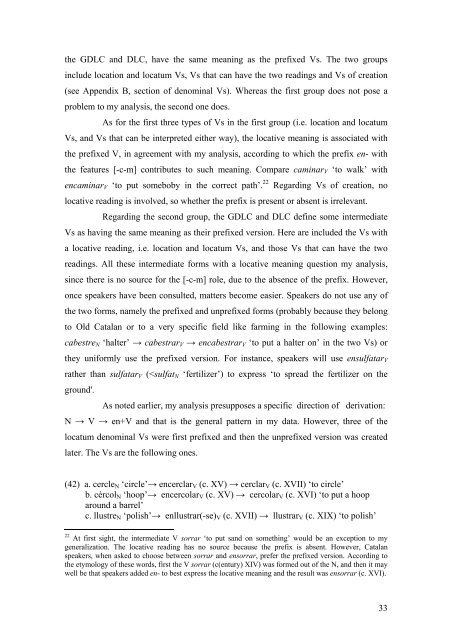Prefixation in English and Catalan - Departament de Filologia ...
Prefixation in English and Catalan - Departament de Filologia ...
Prefixation in English and Catalan - Departament de Filologia ...
You also want an ePaper? Increase the reach of your titles
YUMPU automatically turns print PDFs into web optimized ePapers that Google loves.
the GDLC <strong>and</strong> DLC, have the same mean<strong>in</strong>g as the prefixed Vs. The two groups<br />
<strong>in</strong>clu<strong>de</strong> location <strong>and</strong> locatum Vs, Vs that can have the two read<strong>in</strong>gs <strong>and</strong> Vs of creation<br />
(see Appendix B, section of <strong>de</strong>nom<strong>in</strong>al Vs). Whereas the first group does not pose a<br />
problem to my analysis, the second one does.<br />
As for the first three types of Vs <strong>in</strong> the first group (i.e. location <strong>and</strong> locatum<br />
Vs, <strong>and</strong> Vs that can be <strong>in</strong>terpreted either way), the locative mean<strong>in</strong>g is associated with<br />
the prefixed V, <strong>in</strong> agreement with my analysis, accord<strong>in</strong>g to which the prefix en- with<br />
the features [-c-m] contributes to such mean<strong>in</strong>g. Compare cam<strong>in</strong>arV ‘to walk’ with<br />
encam<strong>in</strong>arV ‘to put someboby <strong>in</strong> the correct path’. 22 Regard<strong>in</strong>g Vs of creation, no<br />
locative read<strong>in</strong>g is <strong>in</strong>volved, so whether the prefix is present or absent is irrelevant.<br />
Regard<strong>in</strong>g the second group, the GDLC <strong>and</strong> DLC <strong>de</strong>f<strong>in</strong>e some <strong>in</strong>termediate<br />
Vs as hav<strong>in</strong>g the same mean<strong>in</strong>g as their prefixed version. Here are <strong>in</strong>clu<strong>de</strong>d the Vs with<br />
a locative read<strong>in</strong>g, i.e. location <strong>and</strong> locatum Vs, <strong>and</strong> those Vs that can have the two<br />
read<strong>in</strong>gs. All these <strong>in</strong>termediate forms with a locative mean<strong>in</strong>g question my analysis,<br />
s<strong>in</strong>ce there is no source for the [-c-m] role, due to the absence of the prefix. However,<br />
once speakers have been consulted, matters become easier. Speakers do not use any of<br />
the two forms, namely the prefixed <strong>and</strong> unprefixed forms (probably because they belong<br />
to Old <strong>Catalan</strong> or to a very specific field like farm<strong>in</strong>g <strong>in</strong> the follow<strong>in</strong>g examples:<br />
cabestreN ‘halter’ → cabestrarV → encabestrarV ‘to put a halter on’ <strong>in</strong> the two Vs) or<br />
they uniformly use the prefixed version. For <strong>in</strong>stance, speakers will use ensulfatarV<br />
rather than sulfatarV (
















